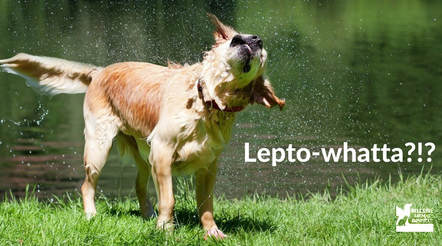What is Leptospirosis?
Leptospirosis is a zoonotic bacteria; meaning it can be spread from animals to humans. The bacteria are often found in rodents, such as mice, but can be found in other wild and domestic animals (dogs, raccoons, opossums, cattle, sheep, goats, etc). The leptospira bacterium is spread through the urine of the infected animal. An animal may be infected with the bacteria, but not have any symptoms at all. In fact, animals that are carriers can continue to spread the bacteria in the environment for months to several years. In the environment (water and soil) the bacteria can survive for weeks to months.
How is it transmitted?
A person that comes in contact with animal urine contaminated with leptospirosis could become infected. The Center for Disease Control (CDC) states that the bacteria can enter through the skin, especially if the skin barrier is broken or damaged, or mucous membranes (eyes, mouth, and nose). Transmission in animals mirrors that of the transmission in people.
What are the symptoms?
According to the CDC website, humans will have fever, chills, headaches, muscle aches, vomiting, jaundice, red eyes, abdominal pain, diarrhea, and a rash. Leptospirosis may also take place in two phases; with the second phase (also known as Weil’s disease) being much more severe. Kidney and/or liver failure and/or meningitis are all possibilities in the second phase. The CDC reports symptoms in pets are as follows: fever, vomiting, jaundice, abdominal pain, diarrhea, refusal to eat, severe depression and weakness, stiffness, severe muscle pain, kidney and/or liver damage, and inability to have puppies.
How is it treated?
With pets that have been diagnosed with leptospirosis, hospitalization is always recommended. Treatment is intensive antibiotic therapy. Patients are hospitalized with an intravenous catheter, started on fluid therapy, intravenous antibiotics, and at times radiographs are warranted. If a patient reaches discharge status, it can be months before a patient’s renal and/or hepatic recovery can take months. Some damage may be irreversible.
Who’s at risk?
Everyone! However, the risk increases if a person enjoys outdoor activities, especially around water. In our pets, it is our belief that they are all at risk. Even here in the city, we have rodents that are potential carriers. Again, though, those risks increase with our furry friends that enjoy outdoor activities such as camping and hiking.
How is it prevented?
In our canine patients, there is a vaccine available to help protect them from acquiring leptospirosis. Dogs that live in the city and country are treated equally when it comes to our recommendation for vaccinating against leptospirosis. We have some of the above-mentioned animals in our own backyards here in the city. We have also had the unfortunate task, of informing pet owners their dog has this devastating disease. Vaccinating your dog against leptospirosis, greatly decreases the chances of your dog acquiring it. If you are unsure if your dogs have been vaccinated against leptospirosis, or have more questions, please feel free to give us a call at the hospital and we would be happy to answer any questions you may have.
- Jayme, Hillside Vet Tech

